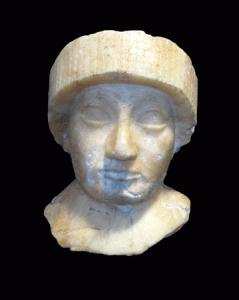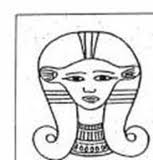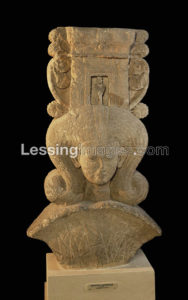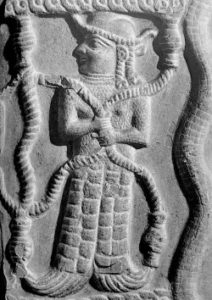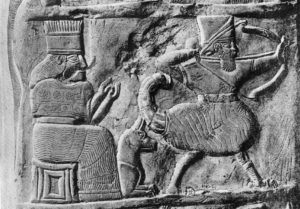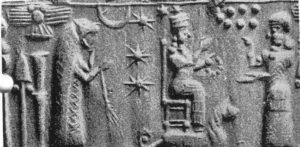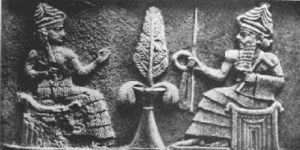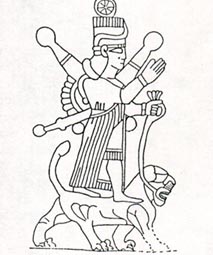Records of the Past, 2nd series, Vol. II, ed. by A. H. Sayce, [1888], at sacred-texts.com
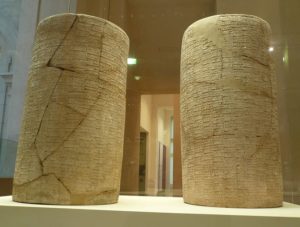 (Gudea Inscriptions)
(Gudea Inscriptions)
(Texts: All Artifacts, Color Coding, & Writings in Bold Type With Italics Inside Parenthesis, are Added by Editor R. Brown, not the Authors, Translators, or Publishers!)
(gods in blue …mixed-breed demigods in teal…)
(Gudea, King of Lagash, giant 2/3rds divine son to goddess Ninsun & spouse Lugalbanda; Ninsun with son Gudea & Ningishzidda)
1. Gudea,
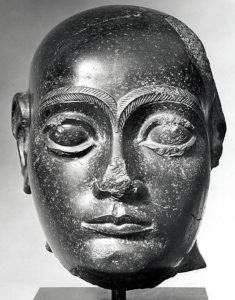 (Gudea, bald headed High-Priest & Governor of Ninurta’s Lagash)
(Gudea, bald headed High-Priest & Governor of Ninurta’s Lagash)
2. the patesi
3. of Shirpurla (Lagash),
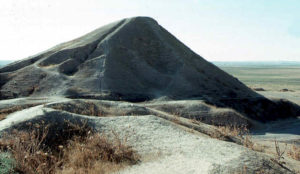 (Ninurta‘s ancient ziggurat residence of mud bricks)
(Ninurta‘s ancient ziggurat residence of mud bricks)
4. who the temple E-ninnû (Ninurta‘s ziggurat temple residence in Lagash)
5. of the god Nin-girsu (Ninurta)
6. has constructed.
COLUMN I
1. For the goddess Nin-gharsag (Ninhursag),
2. the goddess who protects the city,
3. the mother of its inhabitants,
4. for his lady,
5. Gudea
6. the patesi
7. of Shirpurla
8. her temple (residence) of the city Girsu-ki (nearby capitol of Lagash city-state)
9. has constructed.
COLUMN II
1. Her sacred altar (?)
2. he has made.
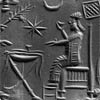 (Ninhursag, Chief Medical Science Officer, in her lab)
(Ninhursag, Chief Medical Science Officer, in her lab)
3. The holy throne of her divinity
4. he has made.
5. In her sanctuary he has placed them.
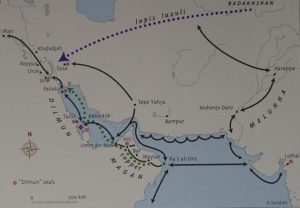 (Dilmun & Magan, virgin lands given by Enki)
(Dilmun & Magan, virgin lands given by Enki)
6. From the mountains of the land of Mâgan2
COLUMN III
1. a rare stone he has caused to be brought;
2. for her statue
3. he has caused it to be cut.
4. “O goddess who fixes the destinies of heaven and earth,
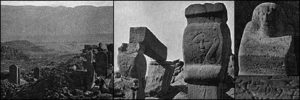 (Ninhursag / Nintu artifacts)
(Ninhursag / Nintu artifacts)
5. Nin-tu (Ninhursag)
6. mother of the gods,
7. of Gudea
COLUMN IV
1. the builder of the temple
2. prolong the life!”
3. by this name he has named it (i.e. the statue),
4. and in the temple he has placed it.
No. 2.—Inscription on Statue B of the Louvre 1
(Texts: All Artifacts, Color Coding, & Writings in Bold Type With Italics Inside Parenthesis, are Added by Editor R. Brown, not the Authors, Translators, or Publishers!)
(gods in blue …mixed-breed demigods in teal…)
COLUMN I
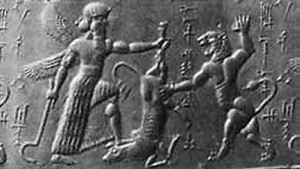 (Ninurta, warrior son to Enlil & NInhursag)
(Ninurta, warrior son to Enlil & NInhursag)
1. In the temple of the god Nin-girsu (Ninurta),
2. his king,
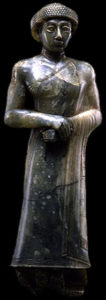 (statue of Gudea, semi-divine King of Lagash)
(statue of Gudea, semi-divine King of Lagash)
-
3. the statue of Gudea,
4. the patesi
5. of Shirpurla (Lagash),
6. who the temple E-ninnû (“House of 50”, Ninurta’s # & residence in Lagash)
7. has constructed:
8. 1 qa of fermented liquor,
9. 1 qa of food,
10. half a qa of …,
11. half a qa of …,
12. such are the offerings which it institutes.
13. As for the patesi
14. who shall revoke them,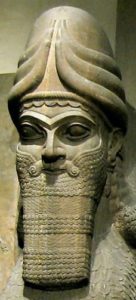 (Ninurta)
(Ninurta)
15. who the orders of the god Nin-girsu
16. shall transgress,
17. let the offerings instituted by him
18. in the temple of the god Nin-girsu
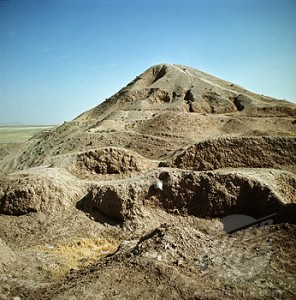 (mud brick temple residence of the god Ningirsu / Ninurta)
(mud brick temple residence of the god Ningirsu / Ninurta)
19. be revoked!
20. Let the commands of his mouth be annulled!
COLUMN II

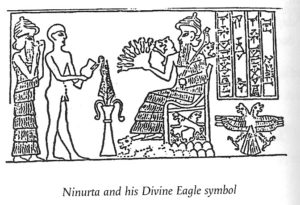 (Ninurta, Enlil‘s warrior son with alien technologies)
(Ninurta, Enlil‘s warrior son with alien technologies)
1. To the god Nin-girsu,
2. the powerful warrior
3. of the god Ellilla (Enlil),
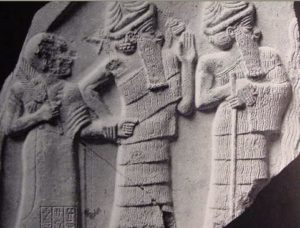 (Gudea lead by the hand of Ningishzidda & Dumuzi)
(Gudea lead by the hand of Ningishzidda & Dumuzi)
4. Gudea,
5. the architect (?),
6. the patesi
7. of Shirpurla,
8. the shepherd chosen by the unchangeable will
9. of the god Nin-girsu,
10. regarded with a favorable eye
11. by the goddess Ninâ (Enki‘s daughter),
12. dowered with power
13. by the god Nin-dara (Nanshe‘s husband),
14. covered with renown
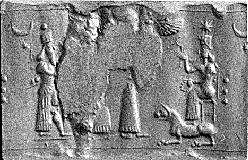 (Prince Ninurta & Princess spouse Bau)
(Prince Ninurta & Princess spouse Bau)
15. by the goddess Bau,
16. the offspring
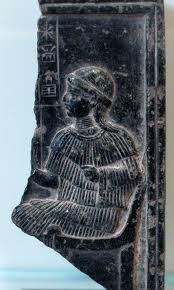 (Ninsun, daughter to Ninurta, mother to mixed-breed son-king Gudea)
(Ninsun, daughter to Ninurta, mother to mixed-breed son-king Gudea)
17. of the goddess Gutumdug (Ninsun),
18. dowered with sovereignty and the scepter supreme
19. by the god Gal-alim (Ninurta‘s son Ig-alim),
COLUMN III
1. proclaimed afar among living creatures
2. by the god Dun-shaga (unidentified?),
3. whose primacy has been firmly founded
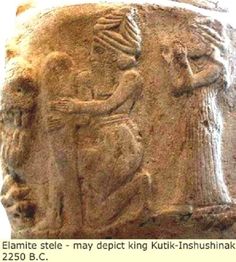 (Ningishzidda, Master Builder of ziggurats, with Ninsun)
(Ningishzidda, Master Builder of ziggurats, with Ninsun)
4. by the god Nin-gish-zida (Enki & Ereshkigal‘s son)
5. his god.
6. After that the god Nin-girsu
7. had turned towards his city a favorable gaze
8. (and) Gudea
9. had chosen as the faithful shepherd of the country
10. (and) among the divisions (?) of men
11. had established his power,
12. then he purified the city and cleansed it.
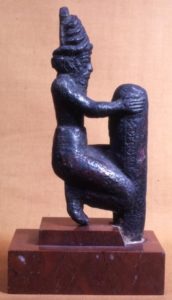
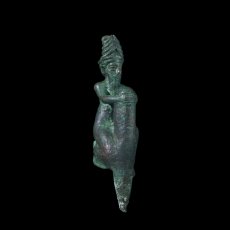 (Ningishzidda lays foundation pegs for ziggurats)
(Ningishzidda lays foundation pegs for ziggurats)
13. He has laid the foundations (of a temple)
14. and deposited the foundation-cylinder.
15. The adorers of the demons (?),1
COLUMN IV
1. the evokers of spirits (?),
2. the necromancers (?),
3. the prophetesses of divine decrees (?),
4. he has banished from the city.
5. Whoever has not departed obediently,
6. has been expelled perforce by the warriors.
7. The temple of the god Nin-girsu
8. in all respects
9. in a pure place he has constructed.
10. No tomb has been destroyed (?),
11. no sepulchral urn has been broken (?),
12. no son has ill-treated his mother.
13. The ministers,
14. the judges,
15. the doctors,
16. the chiefs,
17. during the execution of this work
18. have worn garments of … (?).
19. During all the time (of its construction)
COLUMN V
1. in the cemetery of the city no ditch has been excavated (?),
2. no corpse has been interred (?).
3. The Kalû2 has performed his funeral music or uttered his lamentations;
4. the female mourner has not caused her lamentations to be heard.
5. On the territory
6. of Shirpurla
7. a man at variance (with his neighbor)
8. to the place of oath1
9. leas taken no one;
10. a brigand
11. has entered the house of no one.
12. For the god Nin-girsu
13. his king
 (Gudea’s giant cylinders with his engravings)
(Gudea’s giant cylinders with his engravings)
14. (Gudea) has made the dedicatory inscriptions (?);
15. his temple E-ninnû which illuminates the darkness (?) (reflective finish outer layer),
16. he has constructed
17. and reinstated.
18. In the interior (of this temple) his favorite gigunû
19. of cedar-wood
20. he has constructed for him.
21. After that the temple of the god Nin-girsu
22. he has had constructed,
23. the god Nin-girsu,
24. the king beloved by him,
25. from the Sea of the Highlands (Elam)2
26. to the lower Sea
27. has forcefully opened (the ways) for him.
28. In Amanum,3 the mountain of cedars (in Lebanon),
29. [joists] of cedar,
30. whose [length] was 70 spans,
31. [and joists] of cedar
32. whose [length was] 50 spans,
33. [and joists] of box (?)4
34. whose length was 25 spans,
35. he has caused to be cut;
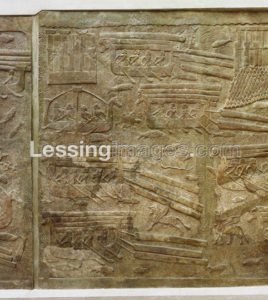 (Lebanese cedars sent to Sumer for Enlil‘s & other giant alien gods residences)
(Lebanese cedars sent to Sumer for Enlil‘s & other giant alien gods residences)
36. from this mountain he has caused them to be brought.
37. The …
38. he has made
39. The …
40. he has made
41. The …
42. he has made
43. The …
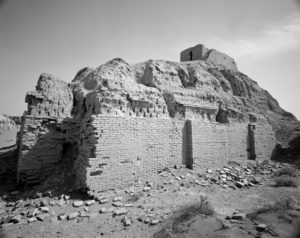 (Enlil‘s ziggurat ruins in his ancient city of Nippur)
(Enlil‘s ziggurat ruins in his ancient city of Nippur)
44. he has made
45. As for the cedars
46. (some) to form great gates
47. he has employed;
48. with brilliant ornaments he has enriched them (?),
49. and in the temple E-ninnû
50. he has placed them.
51. (Others) in his sanctuary E-magh-ki-a-sig-dê-da
52. he has used as beams.
53. Near the city of Ursu,
54. in the mountains of Ib-la1
55. joists of zabanum trees,
56. of great sha-ku2 trees,
57. of tulubum trees, and of gin trees,
58. he has caused to be cut;
COLUMN VI
1. in the temple of E-ninnû
2. he has caused them to be used as beams.
3. From Shamanum
4. in the mountains of Menua,
5. from Susalla (?)3
 (Martu, Anunnaki King Anu‘s & Princess Ninhursag‘s son)
(Martu, Anunnaki King Anu‘s & Princess Ninhursag‘s son)
6. in the mountains of Martu4
7. nagal stones
8. he has caused to be brought;
9. in slabs
10. he has caused them to be cut;
11. the Holy of Holies in the temple E-ninnû
12. he has constructed of them.
13. From Tidanum1
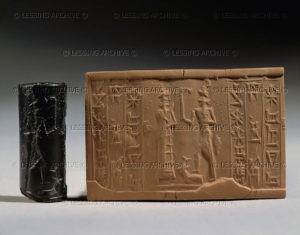 (Princess Ninhursag with her son & brother, Prince Martu)
(Princess Ninhursag with her son & brother, Prince Martu)
14. in the mountains of Martu
15. shirgal-ghabbia stones
16. he has caused to be conveyed;
17. in the form of urpadda
18. he has caused them to be cut;
19. to (receive) the bars of the gates
20. in the temple he has arranged them.
2I. From the country of Kâgal-adda-ki2
22. in the mountains of Ki-mash3
23. I caused copper to be taken,
24. To make the arm (?) from which one escapes not
25. he has employed it.
26. From the country of Melughgha4
27. kala trees5 he has imported;
28. he has caused to be made.6
29. From Kilzanim7
30. he has imported;
31. to make the arm (?) …
32. he has employed it.
33. Gold-dust
34. from the mountains of Ghaghum
35. he has imported;
36. for the fabrication of the arm (?) …
37. he has utilized it.
38. Gold-dust
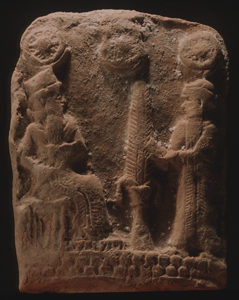 (giant Anunnaki god Martu & mixed-breed king, possibly Gudea?, symbols of gods above)
(giant Anunnaki god Martu & mixed-breed king, possibly Gudea?, symbols of gods above)
39. from the mountains of Melughgha
40. he has imported
41. to make the E-martu1
42. he has employed it.
43. Lid-ri (?)
44. he has imported.
45. From the country of Gubin
46. the land of the ghaluku trees, 2
47. ghaluku wood
48. he has imported;
49. to make pillars (?)
50. he has employed it.
51. From the country of Magda
52. in the mountains of the river Gurruda
53. bitumen (?)
54. he has imported;
55. the platform of the temple E-ninnû
56. he has constructed.
57. Im-gha-um
58. he has imported.
59. From the mountains of Barsip
60. nalua stones
61. in large boats
62. he has caused to be brought;
63. the foundation of the temple E-ninnû he has encircled with them.
64. By arms, the city of Anshan in the country of Elam
65. he has conquered;
66. its spoils
67. to the god Nin-girsu
68. in the temple E-ninnû
69. he has consecrated.
70. Gudea,
71. the patesi
72. Of Shirpurla,
73. after that the temple E-ninnû
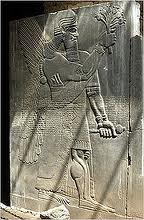 (Royal Prince Ninurta, Anunnaki King Anu‘s grandson, Prince Enlil‘s son & heir)
(Royal Prince Ninurta, Anunnaki King Anu‘s grandson, Prince Enlil‘s son & heir)
74. to the god Nin-girsu
75. he had constructed,
76. has built an edifice:
77. a pillared (?) temple
COLUMN VII
1. no patesi
2. for the god Nin-girsu
3. had constructed;
4. he has constructed it for him.
5. He has written there his name;
6. he has made dedicatory inscriptions (?).
7. The orders of the mouth
8. of the god Nin-girsu
9. he has faithfully executed.
10. From the mountains of the country of Mâgan1
11. a hard stone he has imported.
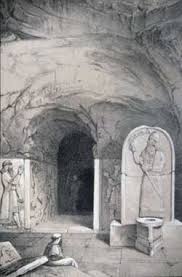 (artifacts by the thousands unearthed in Ninurta temple ruins)
(artifacts by the thousands unearthed in Ninurta temple ruins)
12. For his statue
13. he has caused it to be cut.
14. “O my king,
15. whose temple
16. I have built,
17. may life be my recompense!”
18. By this name he has named (the statue),
19. and in the temple E-ninnû
20. he has erected it.
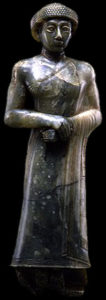
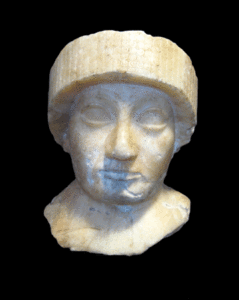 (Gudea, governor, high-priest, & king under Ninurta)
(Gudea, governor, high-priest, & king under Ninurta)
21. Gudea
22. unto the statue
23. has given command:
24. “To the statue of my king
25. speak!”
26. After that the temple E-ninnû,
27. his favorite temple
28. I had constructed,
29. I have remitted penalties, I have given presents.
30. During seven days obeisance has not been exacted.
31. The female slave has been made the equal of her mistress;
32. the male slave
33. has been made the equal of his master;
34. in my city the chief of his subject
35. has been made the equal.
36. All that is evil from this temple
37. I have removed.
38. Over the commands
39. of the goddess Ninâ (Enki‘s daughter)
40. and the god Nin-girsu
41. I have carefully watched.
42. A fault (?) the rich man has not committed;
43. all that he has desired (?) the strong man has not done.
44. The house where there was no son,
45. it is its daughter, who new offerings (?)
46. has consecrated;
47. for the statue of the god
48 before the mouth she has placed them.
49. Of this statue,
50. neither in silver nor in alabaster
51. nor in copper nor in tin
52. nor in bronze
53. let any one undertake the execution!
54. Let it be of hard stone!
55. Let a sacristy be established,
56. and of all that shall be brought there
57. let nothing be destroyed!
58. The statue which is before thee,
59. O god Nin-girsu,
60. the statue.
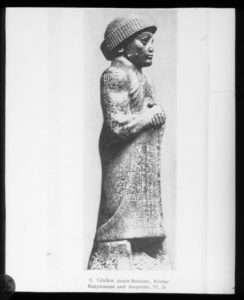 (Gudea, 2/3rds divine son to Ninsun, grandson to Ninurta)
(Gudea, 2/3rds divine son to Ninsun, grandson to Ninurta)
61. of Gudea,
COLUMN VIII
1. the patesi
2. Of Shirpurla,
3. who the temple (residence) E-ninnû
4. of the god Nin-girsu
5. has constructed,
6. whosoever from the temple E-ninnû
7. shall remove
8. (or) its inscription
9. shall efface;
10. whosoever shall break it;
I1. on the fortunate day of the commencement of the year,
12. whoever in the place of my god,
13. his god—
(giant mixed-breed king & Ninurta with his winged beast symbol / alien hi-tech storm bird)
14. and it is Nin-girsu
15. who is my king—
16. in the country shall invoke;
17. (whoever) my judgments
18. shall transgress,
19. my gifts
20. shall revoke;
21. (whoever) in the recitation of my prayers
22. shall suppress my name
23. and insert his own;
24. (whoever) of the Holy of Holies of the god Nin-girsu, my king,
25. shall abandon the service (?)
26. and shall not keep it (ever) before his eyes;—
27. from the most distant days,
28. of all men of noble race,
29. of the patesis
30. of Shirpurla
31. who the temple E-ninnû
32. of the god Nin-girsu
33. my king
34. have constructed,
35. and who have made dedicatory inscriptions (?),
36. the words of their mouth
37. let no one change
38. nor transgress their judgments!
39. Of Gudea,
40. the patesi
41. of Shirpurla,
42. whoever shall change his words
43. or transgress his judgments,
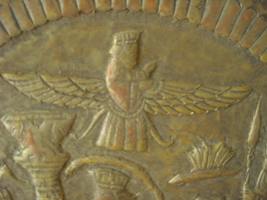
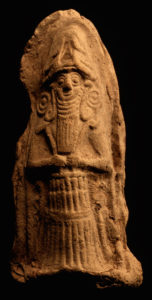 (Anunnaki King Anu, & his sky-disc; Anu)
(Anunnaki King Anu, & his sky-disc; Anu)
44. may the god Anna (Anu),
 (Enlil, Anu‘s son & Heir, Earth Colony Commander, Ninurta‘s father)
(Enlil, Anu‘s son & Heir, Earth Colony Commander, Ninurta‘s father)
45. may the god Ellilla (Enlil),
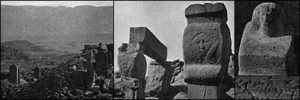 (Ninhursag artifacts)
(Ninhursag artifacts)
46. may the goddess Nin-gharsag
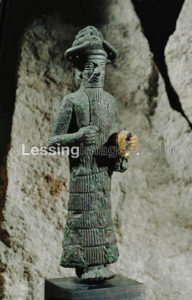
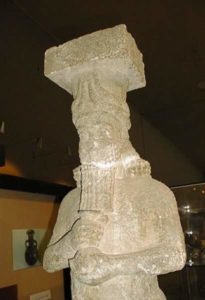 (Prince Enki, King Anu‘s eldest & wisest son, 1st to land on Earth with crew of 50)
(Prince Enki, King Anu‘s eldest & wisest son, 1st to land on Earth with crew of 50)
47. may the god En-ki, whose word is unchangeable,
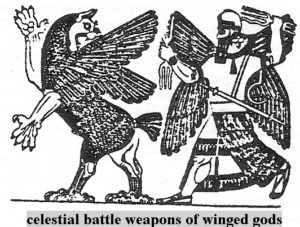 (Ninurta stops Anzu‘s coup against father Enlil)
(Ninurta stops Anzu‘s coup against father Enlil)
48. may the god En-zu (Anzu?), whose name none pronounces,
49. may the god Nin-girsu
50. the king of weapons (alien technologies),
51. may the goddess Ninâ (Enki & Ninhursag‘s daughter)
52. the mistress of interpretations,
53. may the god Nin-dara (Nanshe‘s husband)
54. the royal warrior,
55. may the mother of Shirpurla
56. the august goddess Gatumdug (Ninsun, Ninurta‘s daughter),
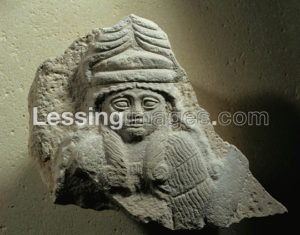 (Princess Bau, King Anu‘s daughter, Ninurta‘s spouse)
(Princess Bau, King Anu‘s daughter, Ninurta‘s spouse)
57. may the goddess Bau (Ningirsu‘s spouse)
58. the lady the elder daughter of Anna (Anu),
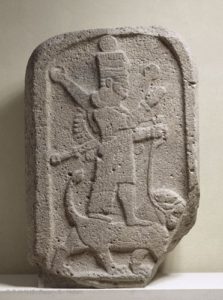
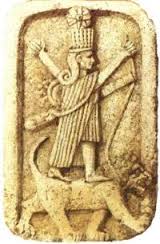 (Inanna, Goddess of Love & War)
(Inanna, Goddess of Love & War)
59. may the goddess Ninni (Inanna)
60. the lady of battles,
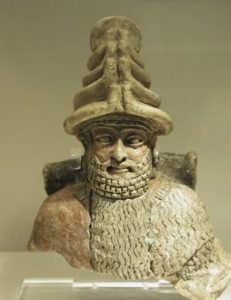 (Utu, son to Nannar, twin to Inanna, symbolized as the Sun God)
(Utu, son to Nannar, twin to Inanna, symbolized as the Sun God)
61. may the god Babbar (Utu)
62. the king of abundance (?),
63. may the god Pasag (unidentified?)
64. the master workman of men (aliens directing earthlings to the work),
65. may the god Gal-alima (Ninurta‘s son Igalim),
66. may the god Dun-shagana (unidentified?),
67. may the goddess Nin-marki (Enki & Nina’s daughter)
COLUMN IX
1. the eldest daughter of the goddess Ninâ (Enki & Ninhuerag‘s daughter),
2. may the goddess Duzi-abzu (Geshtinanna, Enki & Ninsun‘s daughter)
3. the mistress of Kinunir-ki,
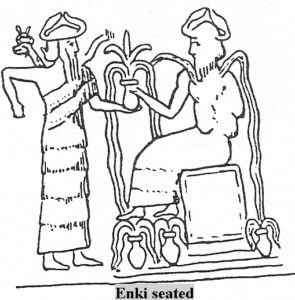 (Ningishzidda, DNA Master Scientist, & his father Enki)
(Ningishzidda, DNA Master Scientist, & his father Enki)
4. may my god Nin-gishzida (Enki & Ereshkigal‘s’s son),
5. change his destiny!
6. Like an ox,
7. may he be slain in the midst of his prosperity!
8. Like a wild bull
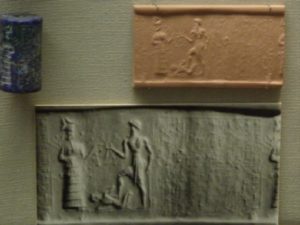 (giant aliens Inanna & twin Utu with earthling underfoot)
(giant aliens Inanna & twin Utu with earthling underfoot)
9. may he be felled in the plenitude of his strength!
10. As for his throne, may those even whom he has reduced to captivity
11. overthrow it in the dust!
12. To efface its traces (?),
13. even of its memory (?),
14. may they apply their care!
15. His name, in the temple of his god
16. may they efface from the tablets!
17. May his god
18. for the ruin of the country have no look (of pity)!
19. May he ravage it with rains from heaven!
20. May he ravage it with the waters of the earth!
21. May he become a man without a name!
22. May his princely race be reduced to subjection!
23. May this man,
24. like every man who has acted evilly towards his chief,
25. afar, under the vault of heaven, in no city whatsoever
26. find a habitation!
27. Of the champion of the gods,
28. the lord Nin-girsu,
29. the greatness
30. may the peoples proclaim!
No. 3.—Inscription on Statue C of the Louvre.1
(gods in blue …mixed-breed demigods in teal…)
COLUMN I
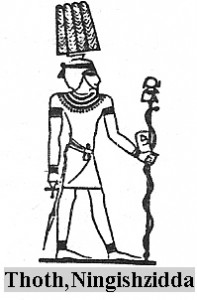 (ziggurat builder in Sumer, pyramid builder in Egypt, ziggurat builder in Meso-America)
(ziggurat builder in Sumer, pyramid builder in Egypt, ziggurat builder in Meso-America)
1. The god Nin-gish-zida (Enki & Ereshkigal‘s son)
2. is the god of Gudea,
3. the patesi
4. of Shirpurla (Lagash),
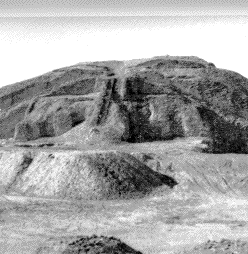 (E-anna, mud-brick-built residence of Anu, Inanna, etc., in Uruk)
(E-anna, mud-brick-built residence of Anu, Inanna, etc., in Uruk)
5. who the temple E-anna (Anu‘s & Inanna‘s temple residence in Uruk)
6. has constructed.
COLUMN II
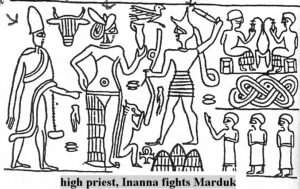 (naked goddess Inanna, Goddess of Love & War)
(naked goddess Inanna, Goddess of Love & War)
1. To the goddess Ninni (Inanna),
2. the mistress of the world,
3. to his lady,
4. Gudea
5. the architect (?),
6. the patesi
7. Of Shirpurla,
8. who the temple of E-ninnû
9. of the god Nin-girsu
10. has constructed.
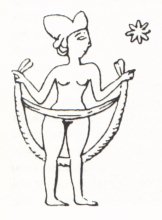
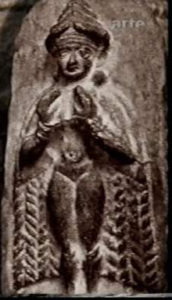 (Inanna, Goddess of Love with her 8-Pointed Star symbol of Venus, spouse to many semi-divine kings)
(Inanna, Goddess of Love with her 8-Pointed Star symbol of Venus, spouse to many semi-divine kings)
11. After that the goddess Ninni (Inanna)
I2. her favorable regard
13. had cast upon him,
14. Gudea,
15. the patesi
16. Of Shirpurla,
17. a man endowed with large understanding,
18. a servant to his mistress
19. devoted,
20. to make the tablet-like amulets (?)
21. has ordered (?);
22. of the ka-al
23. he has caused the splendor to shine.
COLUMN III
1. His clay (for the construction of the temple) in a pure place
2. he has caused to be taken;
3. his bricks
4. in a holy place
5. he has caused to be molded.
6. Its site (?)
7. he has cleaned and leveled (?);
8. its foundation (?)
9. in the …
10. he has firmly established (?).
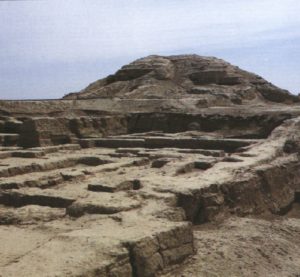 (E-anna ziggurat way above Uruk city below, all mud brick!)
(E-anna ziggurat way above Uruk city below, all mud brick!)
11. The favorite temple (of the goddess),
12. the temple of E-anna in Girsu-ki (name for Uruk temple),
13. he has built.
14. From the mountains of the land of Mâgan
15. a rare stone he has imported;
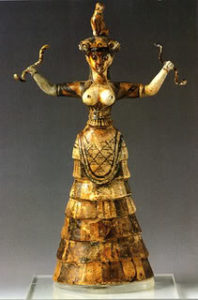 (Inanna, spoiled, favored descendant to King Anu)
(Inanna, spoiled, favored descendant to King Anu)
16. for her statue
17. he has caused it to be cut.
18. “Of Gudea,
19. the builder of the temple
COLUMN IV
1. may she prolong the life!”
2. by this name he has named it (i.e. the statue),
3. and in the temple of E-anna
4. he has placed it.
5. Whoever from the temple of E-anna
6. shall remove it,
7. shall break it,
8. (or) shall efface its inscription,
9. may the goddess Ninni (Inanna),
10. the mistress of the world,
11. from top to bottom1
12. overthrow him!
13. Of his throne established
14. the foundations
15. may she not maintain!
16. may she annihilate his race!
17. may she cut off the years of his reign!
No. 4.—Inscription on Statue D of the Louvre.2
Cartouche on the right shoulder.
(gods in blue …mixed-breed demigods in teal…)
1. Gudea,
2. the patesi
3. Of Shirpurla.
COLUMN I
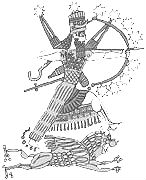 (warrior god Ninurta riding his winged lion-headed beast)
(warrior god Ninurta riding his winged lion-headed beast)
1. To the god Nin-girsu,
2. the powerful warrior (son)
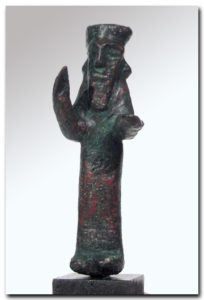
 (Earth Colony Commander Enlil)
(Earth Colony Commander Enlil)
3. of the god Ellilla (Enlil),
4. to his king,
5. Gudea,
6. the patesi
7. Of Shirpurla,
8. the architect (?)
9. the constructor of the (sacred) bark
10. of the god Ellilla (Enlil),
11. the shepherd chosen by the immutable will
12. of the god Nin-girsu,
13. the powerful minister
14. of the goddess Ninâ (Enki & Ninhursag‘s daughter),
15. covered with renown
16. by the goddess Bau,
17. the offspring begotten
18. by the goddess Gatumdug (Ninsun),
19. endowed with sovereignty and the scepter supreme
COLUMN II
1. by the god Gal-alim (Ninurta‘s son Igalim),
2. proclaimed afar among living creatures
3. by the god Dun-shagâna (unidentified?),
4. the governor
5. who loves his city,
6. (who) has made dedicatory (?) inscriptions,
7. (and who) his temple of E-ninnû, which illumines the darkness,
8. has constructed.
9. In the interior (of the temple) his favorite gigunû1
10. he has made for him of cedar-wood.
11. The temple of E-ghud, his temple in 7 stages (7-step ziggurats),
12. he has constructed.
13. In this temple the offerings
14. of the goddess Bau
COLUMN III
1. his lady
2. he has regulated.
3. His favorite bark …
4. named Kar-nun-ta-êa2
5. he has caused to be made;
6. on the Kar-zagin-kâ-surra3
7. he has placed it.
8. The crew of this bark …
9. and its captain
10. he has organized.
11. The temple of his lord
12. to the summit he has raised (?).
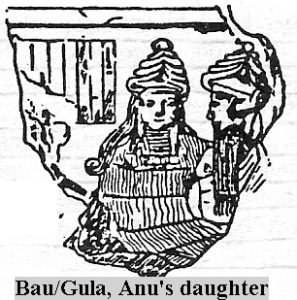 (Royal Princess Bau & nephew-spouse Ninurta)
(Royal Princess Bau & nephew-spouse Ninurta)
13. For the goddess Bau,
14. the good lady,
15. the daughter of Anna (Anu),
16. for his lady
17. her temple of Uru-azagga
COLUMN IV
1. he has constructed.
2. By the power of the goddess Ninâ (Enki & Ninhursag‘s daughter),
3. by the power of the god Nin-girsu (Ninurta),
4. to Gudea
5. who has endowed with the scepter
6. the god Nin-girsu,
7. the country of Mâgan,1
8. the country of Melughgha,
9. the country of Gubi,2
10. and the country of Nituk,3
11. which possess every kind of tree,
12. vessels laden with trees of all sorts
13. into Shirpurla (Lagash)
14. have sent.
15. From the mountains of the land of Mâgan
16. a rare stone he has caused to come;
17. for his statue\
COLUMN V
1. he has caused it to be cut.
2. “O king, for the force immense which
3. no country can resist (?),
4. O god Nin-girsu,
5. for Gudea
6. the builder of the temple
7. appoint a prosperous fate!”
8. by this name he has named (the statue),
9. (and) in the temple of E-ninnu
10. he has placed it.
No. 5.—Inscription on Statue E of the Louvre.
Cartouche on the right shoulder.
(gods in blue …mixed-breed demigods in teal…)
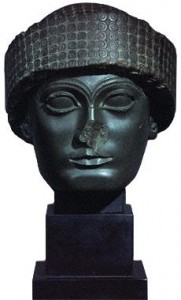
 (Gudea; Gudea, Ningishzidda, & Dumuzi)
(Gudea; Gudea, Ningishzidda, & Dumuzi)
1. Gudea,
2. the patesi
3. of Shirpurla.
COLUMN I
1. To the goddess Bau,
2. the good lady,
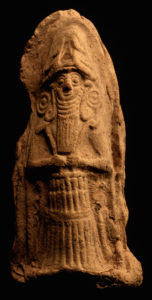 (Anu, King of the one-world-order planet Nibiru, & their Earth Colony)
(Anu, King of the one-world-order planet Nibiru, & their Earth Colony)
3. the daughter of Anna,
4. the mistress of Uru-azagga,
5. the mistress of abundance,
6. the lady who fixes the destinies of Girsu-ki,
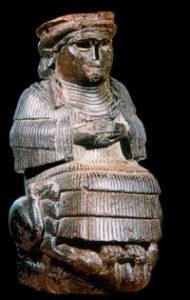
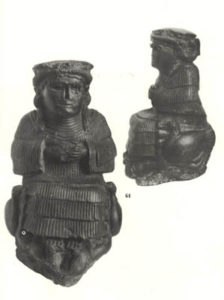 (Anu‘s daughter Bau)
(Anu‘s daughter Bau)
7. the lady who judges her city,
8. the lady beloved of mortals (?),
9. the lady of death (?),
10. to his lady,
11. Gudea
12. the patesi
13. of Shirpurla,
14. who (the temple) of E-ninnû
15. of the god Nin-girsu
16. has constructed.
17. After that the goddess Bau
18. his mistress
19. in her august heart had chosen him
COLUMN II
1. as a servant full of reverential fear,
2. for his mistress
3. the greatness of his mistress
4. he has proclaimed,
5. (and) in his clear intelligence (?)
6. to the goddess Bau
7. his lady
8. has entrusted himself.
9. As the temple of E-ninnû,
10. the favorite temple
(Ninurta in beast skin, Bau seated, & her 1/2 brother Enlil, father to Ninurta)
11. of the god Nin-girsu
12. his king
13. he had constructed,
14. so for the goddess Bau
15. the daughter of Anna
16. the mistress of Uru-azagga,
17. his mistress,
18. the temple of E-sil-sirsira,
19. her favorite temple,
20. he has constructed;
21. the city he has cleansed (?),
22. and leveled (?);
COLUMN III
1. to make tablet-like amulets (?)
2. he has given orders (?);
3. of the ka-al
4. he has caused the splendor to shine.
5. Its clay (for the construction of the temple) in a pure place
6. he has caused to be taken;
7. its bricks in a holy place
8. he has caused to be molded.
9. The brick-like amulets (?) he has caused to be made;
10. the dedicatory inscriptions he has composed (?).1
11. Its site he has cleansed (?)
12. and leveled (?);
13. its foundations (?)
14. in the …
15. he has firmly established (?).
16. For the goddess Bau,
17. his mistress,
18. the mistress who Uru-azagga
19. directs,
20. in Uru-azagga,
COLUMN IV
1. in a pure place,
2. he has built the temple.
3. The holy throne
4. of his divinity
5. he has made;
6. in the place of her oracles
7. he has installed it.
8. Her sacred altar (?)
9. he has made;
10. in her sanctuary
11. he has placed it.
12. The tabernacle (?) (called) Nin-an-dagal-ki1
13. he has made;
14. in her sanctuary
15. he has installed it.
COLUMN V
1. At the commencement of the year,
2. the festival of the goddess Bau
3. when offerings are made to her,—
4. 1 ox she,2
5. 1 sheep ni,3
6. 3 sheep she,
7. 6 sheep ush,4
8. 2 lambs,
9. 7 pat of dates,
10. 7 shab of cream,
11. 7 shoots of a palm,
12. 7 … ,
13. 7 …,
14. 1 bird …,
15. 7 swans,
16. 15 cranes,
17. 1 bird (?) …
18. with its 15 eggs (?),
19. 1 tortoise (?)
20. with its 30 eggs (?),
21. 30 garments of wool,
22. 7 garments of …,
COLUMN VI
1. 1 garment of …,
2. (such were) the offerings of the goddess Bau
3. in the ancient temple
4. on that day.
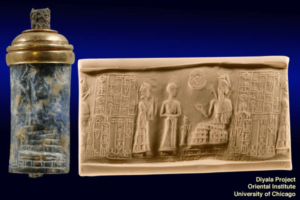 (Ninsun, her son Gudea, & Ningishzidda)
(Ninsun, her son Gudea, & Ningishzidda)
5. Gudea,
6. the patesi
7. of Shirpurla,
8. after that for the god Nin-girsu
9. his king
10. his favorite temple,
I1. the temple of E-ninnû,
12. he had constructed,
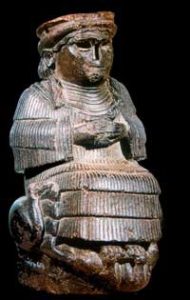
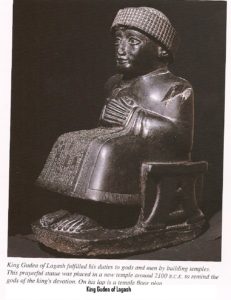 (Bau & Gudea)
(Bau & Gudea)
13. (and after that) for the goddess Bau
14. his mistress
15. her favorite temple,
16. the temple of E-sil-sirsira,
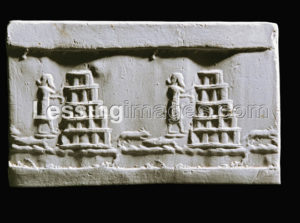 (alien giant ziggurat houses built by the gods, then by earthlings)
(alien giant ziggurat houses built by the gods, then by earthlings)
17. he had constructed,—
18. 2 oxen she,
19. 2 sheep ni,
20. 10 sheep she,
21. 2 lambs,
22. 7 pat of dates,
23. 7 shab of cream,
24. 7 shoots of a palm,
25. 7 …,
COLUMN VII
1. 7 …
2. 14 …
3.14 …,
4. 1 bird …,
5. 7 swans,
6. 15 cranes,
7. 7 birds…,
8. 1 bird (?)…
9. with its 15 eggs (?),
10. 1 tortoise (?)
11. with its 30 eggs (?),
12. 40 garments of wool,
13. 7 garments of …,
14. 1 garment of …,
15. (such are) the offerings to the goddess Bau,
16. which in the new temple
17. Gudea,
18. the patesi
19. Of Shirpurla,
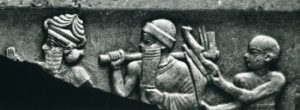 (Enlil leads semi-divine king & earthling to repair ziggurats)
(Enlil leads semi-divine king & earthling to repair ziggurats)
20. the builder of the temple
21. has added.
22. The temple of the goddess Bau
23. having been restored,
24. its prosperity
COLUMN VIII
1. having been assured;
2. of the throne of Shirpurla (Lagash)
3. the foundation having been strengthened;
4. for Gudea,
5. the patesi
6. of Shirpurla,
7. the scepter of command
8. having been placed in the hand;
9. of his life
10. the days having been prolonged;
11. (then) his god
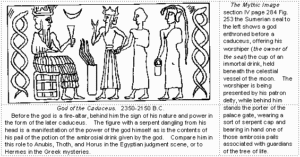 (Enki, Ningishzidda, Gudea, & unidentified)
(Enki, Ningishzidda, Gudea, & unidentified)
12. Nin-gish-zida (Enki‘s & Ereshkigal‘s son)
13. and the goddess Bau
14. into his temple of Uru-azagga
15. he has introduced.
16. In that year
17. from the mountains of the land of Mâgan
18. he has caused a rare stone to be brought;
19. for his statue
20. he has caused it to be cut.
COLUMN IX
1. O my mistress …
2. ……
3. ……!”
4. by this name he has named (the statue),
5. and in the temple he has placed it.
6. (This) statue
7. of the man who the temple of the goddess Bau
8. has constructed,
9. let no one from the place of its installation
10. remove it!
11. His prescriptions
12. let no one transgress!
No. 6.—Inscription on Statue F of the Louvre 1
Cartouche on right shoulder.
(gods in blue …mixed-breed demigods in teal…)
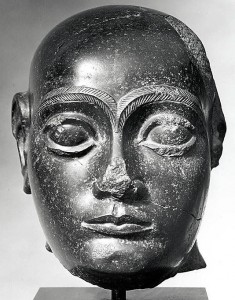 (Gudea, son to Ninsun, leader of Lagash 2,144 B.C.)
(Gudea, son to Ninsun, leader of Lagash 2,144 B.C.)
1. Gudea,
2. the patesi
3. of Shirpurla,
4. the man of the goddess Gatumdug (Ninsun).
COLUMN I
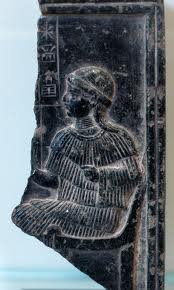 (Ninsun, mother goddess to Gudea)
(Ninsun, mother goddess to Gudea)
1. To the goddess Gatumdug (Ninsun),
2. the mother of Shirpurla,
3. Gudea
4. the patesi
5. of Shirpurla,
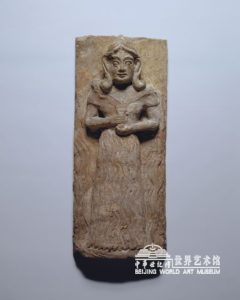 (Ninsun, mother to alien gods, & many earthling mixed-breeds appointed to kingships)
(Ninsun, mother to alien gods, & many earthling mixed-breeds appointed to kingships)
6. the man of the goddess Gatumdug (Ninsun, Ninurta‘s daughter),
7. thy favorite servant,
8. who has made the dedicatory (?) inscriptions,
9. (and) the temple of E-ninnû which illuminates the darkness (?),
10. (the temple) of the god Nin-girsu
11. (who) has constructed,
12. the goddess Gatumdug (Ninsun, Gudea’s mother)
13. his lady,
14. who in Shirpurla,
15. her favorite city,
16. for the supreme rank (?)
COLUMN II
1. has created him,
2. the temple of the goddess Gatumdug (Ninsun, Bau & Ninurta‘s daughter)
3. his lady
4. to construct
5. has given him the order.
6. Gudea
7. the patesi
8. of Shirpurla,
9. a man endowed with large intelligence,
10. a servant filled with reverential fear
11. for his mistress,
12. to make tablet-like amulets (?)
13. has commanded (?);
14. of the ka-al
15. he has caused the splendor to shine.
16. The clay (for the construction of the temple) in a pure place
17. he has caused to be taken;
18. its bricks in a holy place
19. he has caused to be molded.
COLUMN III
1. Its site he has cleansed (?)
2. and leveled (?);
3. its foundation (?)
4. in the …
5. he has firmly established (?).
6. In Uru-azagga, in a pure place,
7. he has built the temple.
8. The holy throne of her divinity
9. he has made.
10. Her sacred altar (?)
11. he has made.
12. The oxen il-la1
13. he has formed into a herd,
14. their herdsman
15. he has established.
16. To the sacred cows
17. he has added sacred calves;
18. their drover
19. he has established.
20. To the sacred sheep
21. he has added sacred lambs;
22. their shepherd
23. he has established.
24. To the sacred she-goats
25. he has added sacred kids;
26. their goatherd
27. he has established.
28. Each herd (?) of dams, whatever be the species,
29. with a herd (?) of younglings in addition
30. he has increased.
31. Their guardian
32. he has established.
No. 7.—Inscription on Statue G of the Louvre
(gods in blue …mixed-breed demigods in teal…)
COLUMN I
1. To the god Nin-girsu,
2. the powerful warrior
3. of the god Ellilla (Enlil),
4. to his king,
5. Gudea
6. the patesi
7. Of Shirpurla,
8. who the temple of E-ninnû
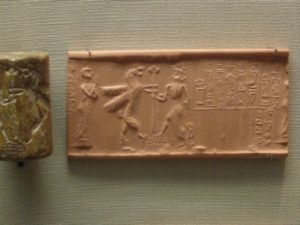 (semi-divine king & Ninurta with winged beast symbol)
(semi-divine king & Ninurta with winged beast symbol)
9. of the god Nin-girsu (Gudea‘s grandfather)
10. has constructed,
11. for the god Nin-girsu
12. his king,
13. the temple of E-ghud, the temple of the 7 stages,
14. this temple of E-ghud,
15. from the summit whereof
16. the god Nin-girsu
17. dispenses favorable fortunes,
18. he has constructed.
COLUMN II
-
(1. Besides) the offerings
2. which in the joy of his heart
3. to the god Nin-girsu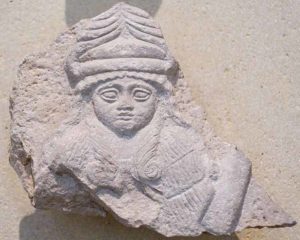 (Bau, daughter to Anu, spouse to Ninurta)
(Bau, daughter to Anu, spouse to Ninurta)
4. to the goddess Bau,
5. the daughter of Anna,
6. his favorite wife,
7. he presented,
8. for his god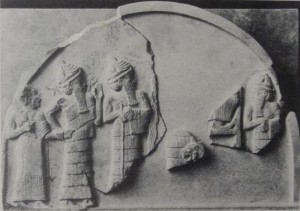 (Gudea, Ningishzidda, & Dumuzi)
(Gudea, Ningishzidda, & Dumuzi) 9. Nin-gish-zida (Enki & Ereshkigal‘s son- in some texts)
10. he has established others also.
11. Gudea
12. the patesi
13. Of Shirpurla
14. from Girsu-ki
15. to Uru-azagga
16. has proclaimed peace.
17. In that year,
COLUMN III
1. from the mountains of the country of Mâgan
2. he has caused a rare stone to be brought;
3. for his statue
4. he has caused it to be cut.
Here 10 lines have been left blank, it having been intended to fill them up with the name of the statue.
5. On the day of the commencement of the year,
6. the festival of the goddess Bau,
7. when the offerings are presented,—
8. 1 ox she1
9. 1 sheep ni,2
10. 3 sheep she,
COLUMN IV
1. 6 sheep ush,3
2. 2 lambs,
3. 7 pat of dates,
4. 7 shab of cream,
5. 7 shoots of a palm,
6. 7 ……
7. 7 ……
8. 1 bird ……
9. 7 swans,
10. 15 cranes,
11. 1 bird (?) …
12. with its 15 eggs (?),
13. 1 tortoise (?)
14. with its 30 eggs (?),
15. 30 garments of wool,
16. 7 garments of …
17. 1 garment of …
18. (such were) the offerings to the goddess Bau
19. in the ancient temple
20. on that day.
21. Gudea
COLUMN V
1. the patesi
2. of Shirpurla,
3. after that for his god Nin-girsu
4. his king
5. his favorite temple,
6. the temple of E-ninnû,
7. he had constructed,
8. (and after that) for the goddess Bau,
9. his mistress,
10. her favorite temple,
11. the temple of E-sil-sirsira
12. he had constructed,
13. 2 oxen she,
14. 2 sheep ni,
15. 10 sheep she,
16. 2 lambs,
17. 7 pat of dates,
18. 7 shab of cream,
19. 7 shoots of a palm,
20. 7 ……
21. 7 ……
22. 14 ……
COLUMN VI
1. 14 ……
2. 1 bird ……
3. 7 swans,
4. 10 cranes,
5. 7 birds ……
6. 1 bird (?) ……
7. with its 15 eggs (?),
8. 1 tortoise (?)
9. with its 30 eggs (?),
10. 40 garments of wool,
11. 7 garments of …
12. 1 garment of …
13. (such are) the offerings to the goddess Bau
14. which in the new temple
15. Gudea
16. the patesi
17. Of Shirpurla,
18. the constructor of the temple,
19. has added.
No. 8.—Inscription on Statue H of the Louvre
(gods in blue …mixed-breed demigods in teal…)
COLUMN I
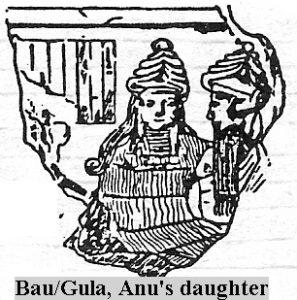 (Princess Bau, daughter to King Anu, & nephew-spouse Ninurta)
(Princess Bau, daughter to King Anu, & nephew-spouse Ninurta)
1. To the goddess Bau,
2. the good lady,
3. the daughter of Anna,
4. the mistress of Uru-azagga,
5. the mistress of abundance, the daughter of the bright sky,
6. to his mistress
7. Gudea
8. the patesi
9. of Shirpurla.
COLUMN II
1. After that the temple of E-sil-sirsira,
2. her favorite temple,
3. the temple which is the marvel of Uru-azagga
4. he had caused to be constructed,
5. from the mountains of the country of Mâgan,
6. a rare stone he has caused to be brought;

 (Bau)
(Bau)
7. for her statue
8. he has caused it to be cut.
COLUMN III
1. O divine daughter, beloved by the bright sky,
2. mother Bau,
3. in the temple of E-sil-sirsira
4. “to Gudea
5. give life!”
6. by this name he has named (the statue),
7. and in the temple of Uru-azagga
8. he has placed it.
Inscription on a stone serving as the threshold of a Door1
(gods in blue …mixed-breed demigods in teal…)
1. For the god Nin-girsu,
2. the powerful warrior
3. of the god Ellilla (Enlil),
4. for his king,
5. Gudea
6. the patesi
7. of Shirpurla
8. has made the dedicatory inscriptions (?),
9. (and) his temple of E-ninnû, which illumines the darkness,
10. has constructed,
11. and restored.
Inscriptions on two unpublished votive tablets
(gods in blue …mixed-breed demigods in teal…)
1. For the goddess Ninni (Inanna),
2. the mistress of the world,
3. for his mistress,
4. Gudea
5. the patesi
6. of Shirpurla
7. her temple of E-anna in Girsu-ki (Uruk)
8. has constructed.
Column II
1. For the god Gal-alim (Ig-alim, Ninurta‘s son),
2. the favorite son
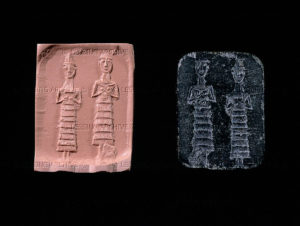 (Ninurta / Ningirsu & spouse Bau)
(Ninurta / Ningirsu & spouse Bau)
3. of the god Nin-girsu,
4. for his king,
5. Gudea
6. the patesi
7. of Shirpurla
8. his temple of E-me-ghush-gal-an-ki
9. has constructed.
Unpublished Inscription on a Brick
(gods in blue …mixed-breed demigods in teal…)
1. For the god Nin-girsu,
2. the powerful warrior
3. of the god Ellilla (Enlil),
4. for his king,
5. Gudea
6. the patesi
7. of Shirpurla
8. his temple of Eninnû, which illumines the darkness (?) (alien technologies),
9. has constructed.
10. In the interior of this temple, a sanctuary of cedar wood,
11. the place of his oracles,
12. he has constructed for him.
Inscription on a Brick1
(gods in blue …mixed-breed demigods in teal…)
1. For the goddess Ninâ (Enki‘ & Ninhursag‘s daughter),
2. the lady of destinies (?),
3. the lady of oracles (?),
4. for his lady,
5. Gudea
6. the patesi
7. of Shirpurla
8. has made the dedicatory inscriptions (?).
 (ziggurat residences of the giant alien gods)
(ziggurat residences of the giant alien gods)
9. In Ninâ-ki, her favorite city,
10. her temple of E-ud-mâ-Ninâ-ki-tag2
11. which rises from the Kur-ê3
12. he has constructed.
Footnotes
75:2 The Sinaitic Peninsula.
76:1 The first column has been translated by Dr. Oppert: Communications à l’Académie des Inscriptions et Belles-Lettres, March 1882.
78:1 I give the translation of the lines which follow, as far as col. v. 1. 4, inclusively, only with the greatest reserve.
78:2 The kalû were a class of priests.
79:1 That is, a court of justice.
79:2 That is, the Persian gulf.
79:3 Evidently Amanus in northern Syria.
79:4 The Assyrian urkarinnu. For its explanation see an article by the Rev. C. J. Ball, Proceedings of the Society of Biblical Archæology, xi. p. 143.
80:1 Dr. Hommel has proposed to read this name Dalla. I should prefer to read Tilla, explained by Urdhu in W. A. I., ii. 48, 13.
80:2 It is the tree called ashûhu by the Assyrians.
80:3 The reading is uncertain. Dr. Hommel reads Kasalla, comparing the Kazalla of W. A. I., iv. 34. 31, 33.
80:4 Phœnicia.
81:1 Identified by Dr. Hommel, with much probability, with Tidnu or “the West” (Syria and Canaan); W. A. I., ii. 48, 12, etc.
81:2 Or a “city of Abullât,” or perhaps the city “Abullu-abishu,” W. A. I., ii. 52. 55.
81:3 Perhaps “the land of Mash” or Arabia Petræa, the Mash of Gen. x. 23. From Ki-mas was derived the Assyrian kêmassi, “copper” (W. A. I., ii. 18, 54; iv. 28, 13).
81:4 In the vicinity of the Sinaitic Peninsula.
81:5 The tree called ushu by the Assyrians.
81:6 If this line is not due to an error, the engraver must have omitted something between lines 27 and 28.
81:7 Perhaps Kilzanim is the name of a country. In this case, the engraver must have made some omission here.
82:1 [“Temple of the West.”—Ed.].
82:2 The tree called huluppu in Assyrian. [The Sumerian name may be read ghalup, of which huluppu would be an Assyrian modification.—Ed.]
83:1 [The Sinaitic Peninsula and Midian.]
87:1 Partially translated by Dr. Hommel: Die Vorsemitischen Kulturen, p. 460.
89:1 Literally “his head in his foundations.”
89:2 Découvertes, pl. 9. Translated by Dr. Oppert in a Communication à l’Académie des Inscriptions, June 23d 1882.
90:1 [Perhaps related to gâgunû, “a field.”—Ed.]
90:2 [I should render: “the quay which comes forth from the lord.”—Ed.]
90:3 Perhaps the name of a canal. [I should translate it: “the quay which runs from the white stone of the gate.”—Ed.]
91:1 [The Sinaitic Peninsula.]
91:2 Perhaps Coptos in Egypt.
91:3 The Tilmun of the Assyrians, in the Persian Gulf.
93:1 Perhaps the foundation-cylinders and clay cones with dedicatory inscriptions.
94:1 [“The lady of the place of the maternal deity.”—Ed.]
94:2 [“Young?”—Ed.]
94:3 [“Fat?”—Ed.]
94:4 [“Male?”—Ed.]
97:1 Découvertes, pl. 14.
99:1 See W. A. I., i. 66, iii. 9.
101:1 [“Young”?—Ed.]
101:2 [“Fat”?—Ed.]
101:3 [“Male”?—Ed.]
103:1 Découvertes, pl. 27, No. 3.
105:1 Découvertes, pl. 37, No. 3. See the inscription on a cone supposed to come from Zerghul (W. A. I. i. 5, No. xxiii. 2). The attributes in lines 2 and 3 of the cone oblige us to restore dingir Ninâ, “the goddess Ninâ (Enki’s daughter),” in the first line.
105:2 [“The house of light which illuminates the ship of Ninâ-ki.”—Ed.]
105:3 [“The mountain of the temple.”—Ed.]
